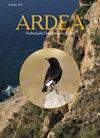Migrations, Destinations and Breeding of Eurasian Curlews Numenius arquata arquata that Spend the Non-Breeding Season in Northern Scotland
IF 1.3
4区 生物学
Q3 ORNITHOLOGY
引用次数: 0
Abstract
The conservation of Eurasian Curlews, whose numbers are declining, is aided through an understanding of environmental challenges faced by the birds throughout the annual cycle. In the Moray Firth, northern Scotland, 48 non-breeding Curlews were tagged with geolocators to describe their migrations (routes, destinations and timing), time of breeding and nest success. Based on 19 recaptures, breeding destinations included northern Scotland (21% of tagged birds), Norway (32%), Sweden (21%) and Finland plus Russia (26%). These percentages matched closely with the results from earlier ringing recoveries/sightings. The median last date in the non-breeding area varied for the Fennoscandian birds: 31 March for those migrating to Norway, 11 April for Swedish birds and 15 April for Finnish birds. The amount of migratory fuel accumulated prior to departure in early April was 10–13% of the late winter mass, sufficient for a 1000-km flight, which was similar to the median distance to Norwegian, but not Swedish or Finnish, destinations. Staging en route characterised the migrations to these latter destinations, resulting in longer migration times. Most of the Fennoscandian Curlews migrated across the North Sea with a tailwind component in spring, but all had a headwind component in autumn. A first-year bird remained in northern Scotland for the first summer, but migrated to Russia in the second and did not nest. Arrival on the breeding grounds varied significantly according to destination. Males and females incubated at different parts of the 24-hour cycle, even although there were 24 hours of daylight for most birds. Of birds that nested, 63% hatched clutches, some after a second attempt. Periods of 24 hours of daylight masked the initial departure from the breeding grounds, so only the latter part of the autumn migration and first date back at the non-breeding area were recorded (11 July), with no difference among the Fennoscandian breeding birds.在苏格兰北部度过非繁殖期的欧亚鹬的迁徙、目的地和繁殖
欧亚鸻的数量正在下降,通过了解鸟类在整个年度周期中面临的环境挑战,有助于保护它们。在苏格兰北部的马里湾,48只非繁殖的Curlews被贴上了地理定位器,以描述它们的迁徙(路线、目的地和时间)、繁殖时间和筑巢成功。根据19次捕获,繁殖地点包括苏格兰北部(21%的被标记鸟类)、挪威(32%)、瑞典(21%)和芬兰加俄罗斯(26%)。这些百分比与早期的铃声恢复/目击结果密切匹配。芬诺斯坎德鸟类在非繁殖区的中位截止日期各不相同:迁徙到挪威的鸟类为3月31日,瑞典鸟类为4月11日,芬兰鸟类为4月15日。4月初出发前积累的迁移燃料量为冬末质量的10-13%,足够飞行1000公里,这与挪威的中位数距离相似,但不是瑞典或芬兰的目的地。途中分期是向后一个目的地迁移的特征,导致迁移时间更长。大多数芬诺斯坎德鸻在春季以顺风方式穿越北海,但在秋季都有逆风。一只一岁的鸟在第一个夏天留在苏格兰北部,但在第二个夏天迁徙到俄罗斯,并且没有筑巢。到达繁殖地的时间因目的地的不同而有很大差异。雄性和雌性在24小时周期的不同部分孵化,尽管大多数鸟类有24小时的白昼。在筑巢的鸟类中,63%孵化了一窝,其中一些是在第二次尝试后孵化的。24小时的白昼掩盖了最初离开繁殖地的时间,因此只记录了秋季迁徙的后期和第一次返回非繁殖地的日期(7月11日),芬诺斯坎德繁殖地的鸟类之间没有差异。
本文章由计算机程序翻译,如有差异,请以英文原文为准。
求助全文
约1分钟内获得全文
求助全文
来源期刊

Ardea
生物-鸟类学
CiteScore
2.10
自引率
0.00%
发文量
49
审稿时长
>12 weeks
期刊介绍:
Ardea is the scientific journal of the Netherlands Ornithologists'' Union, and is published since 1912. The journal welcomes manuscripts reporting significant new findings in ornithology, in particular those covering the ecology, life history, and evolution of birds, and including sound descriptive work. Ardea publishes Original research papers, Short notes and Book reviews. In addition to the regular three issues per year, Ardea publishes specials that contain conference or workshop proceedings (produced on request).
 求助内容:
求助内容: 应助结果提醒方式:
应助结果提醒方式:


